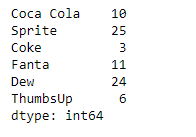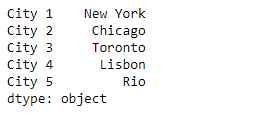Python Pandas Series.ravel()
Pandas系列是一个带有轴标签的一维ndarray。标签不需要是唯一的,但必须是一个可散列的类型。该对象支持基于整数和标签的索引,并提供了大量的方法来执行涉及索引的操作。
Pandas Series.ravel()函数将扁平化的基础数据作为ndarray返回。
语法: Series.ravel(order=’C’)
参数:order
返回: ndarray
示例#1:使用Series.ravel()函数将给定的Series对象的元素作为ndarray返回。
# importing pandas as pd
import pandas as pd
# Creating the Series
sr = pd.Series([10, 25, 3, 11, 24, 6])
# Create the Index
index_ = ['Coca Cola', 'Sprite', 'Coke', 'Fanta', 'Dew', 'ThumbsUp']
# set the index
sr.index = index_
# Print the series
print(sr)
输出 :

现在我们将使用Series.ravel()函数来返回给定Series对象的底层数据,作为一个ndarray。
# return an ndarray
result = sr.ravel()
# Print the result
print(result)
输出 :

正如我们在输出中看到的,Series.ravel()函数已经返回了一个包含给定系列对象数据的ndarray。
示例#2:使用Series.ravel()函数将给定的Series对象的元素作为ndarray返回。
# importing pandas as pd
import pandas as pd
# Creating the Series
sr = pd.Series(['New York', 'Chicago', 'Toronto', 'Lisbon', 'Rio'])
# Create the Index
index_ = ['City 1', 'City 2', 'City 3', 'City 4', 'City 5']
# set the index
sr.index = index_
# Print the series
print(sr)
输出 :

现在我们将使用Series.ravel()函数来返回给定Series对象的底层数据,作为一个ndarray。
# return an ndarray
result = sr.ravel()
# Print the result
print(result)
输出 :

正如我们在输出中看到的,Series.ravel()函数已经返回了一个包含给定系列对象数据的ndarray。
 极客教程
极客教程